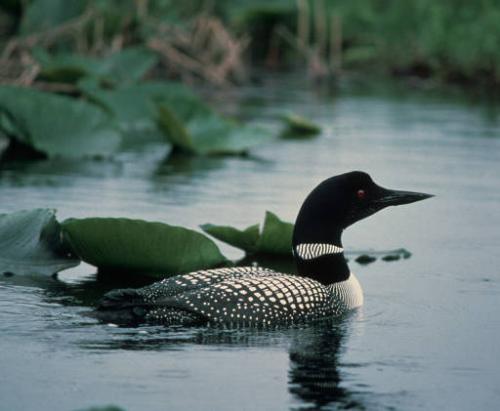
La página que intenta visitar sólo está disponible en inglés. ¡Disculpa!
The page you are about to visit is currently only available in English. Sorry!


A common loon, one of the many birds that can be found in the Great Lakes region. (Photo by U.S. Fish and Wildlife Service)
The Great Lakes are a truly great resource. They’re home to more than 300 bird species, including spotted sandpipers and herons that wade in the coastal marshes, and ospreys and eagles that fish the waters. Muskrats burrow into banks, and wolves, black bears, and moose inhabit wetlands. The lakes hold more freshwater than anywhere else on earth except the polar ice caps, and they supply drinking water to 42 million Americans. On June 26, senators introduced a bill to protect and restore this important region.
Environmentalists lauded the bipartisan bill, the Great Lakes Ecological and Economic Protection Act (GLEEPA), as an important step toward safeguarding the region. “The Great Lakes are a remarkable natural resource that is essential to our economy,” Erin Crotty, executive director of Audubon New York, said in an email. “The environmental health of the lakes, and the birds and other wildlife they support, have been in serious decline due to a myriad of factors, including a legacy of pollution, invasive species, and habitat loss.”
The bill, introduced by co-chairs of the Senate Great Lakes Task Force, Carl Levin (D-MI) and Mark Kirk (R-IL), would protect many key areas for birds in the Great Lakes basin, including wetlands, shorelines, and estuaries. Migrants like the horned grebe, common loons, and bald eagles pass through the estuary in the southern tip of Lake Superior, for instance. Common terns (which, despite their name, are a State Threatened Species) and ring-billed gulls breed on the estuary’s Interstate Island.
The bill calls for:
The next hurdle for GLEEPA will be the Senate Environment and Public Works Committee. govtrack.us puts its odds of making it past this stage at 17 percent (an average of only 12 percent of bills make it through committee).
But if GLEEPA is passed, its effects would be significant for both humans and wildlife: “The Great Lakes Ecological and Economic Protection Act ensures that Mr. Levin's legacy of environmental leadership will continue to benefit birds and bird habitat...for decades to come,” said Jonathan E. Lutz, executive director of Michigan Audubon, in an email.
Related content:
By Susan Cosier
A Great Lakes Adventure: Managing Water Levels (Damned If You Do)
By Adam Hinterthuer
Avian Botulism Plaguing Lake Michigan; Common Loons Suffering
By Julie Liebach